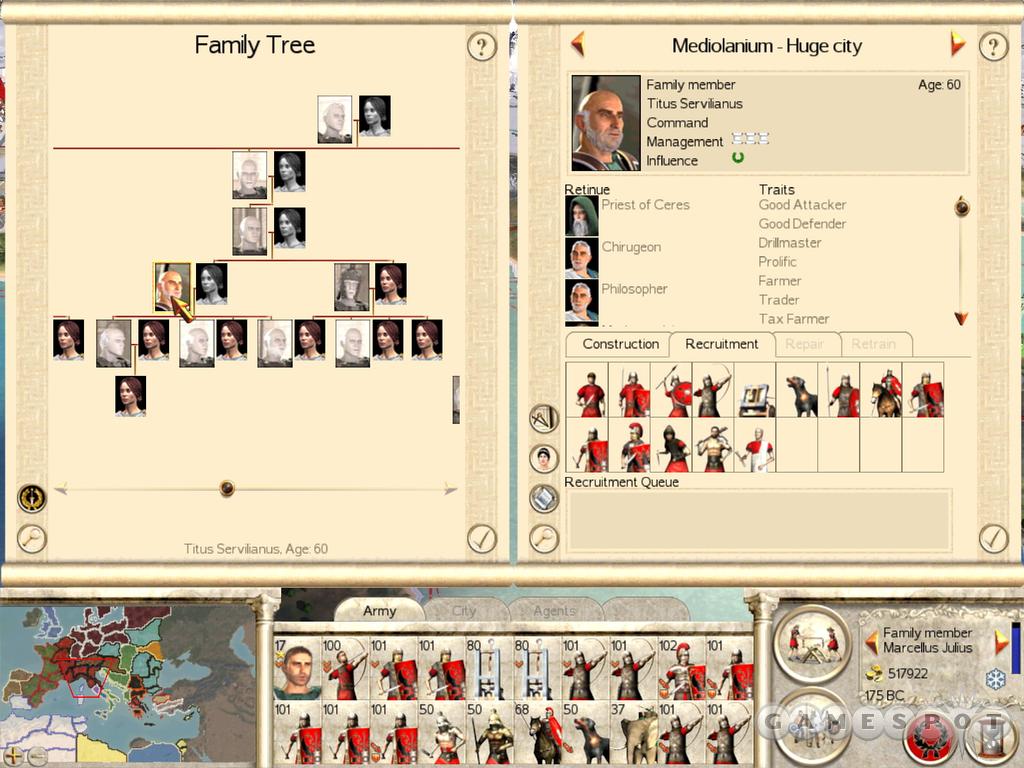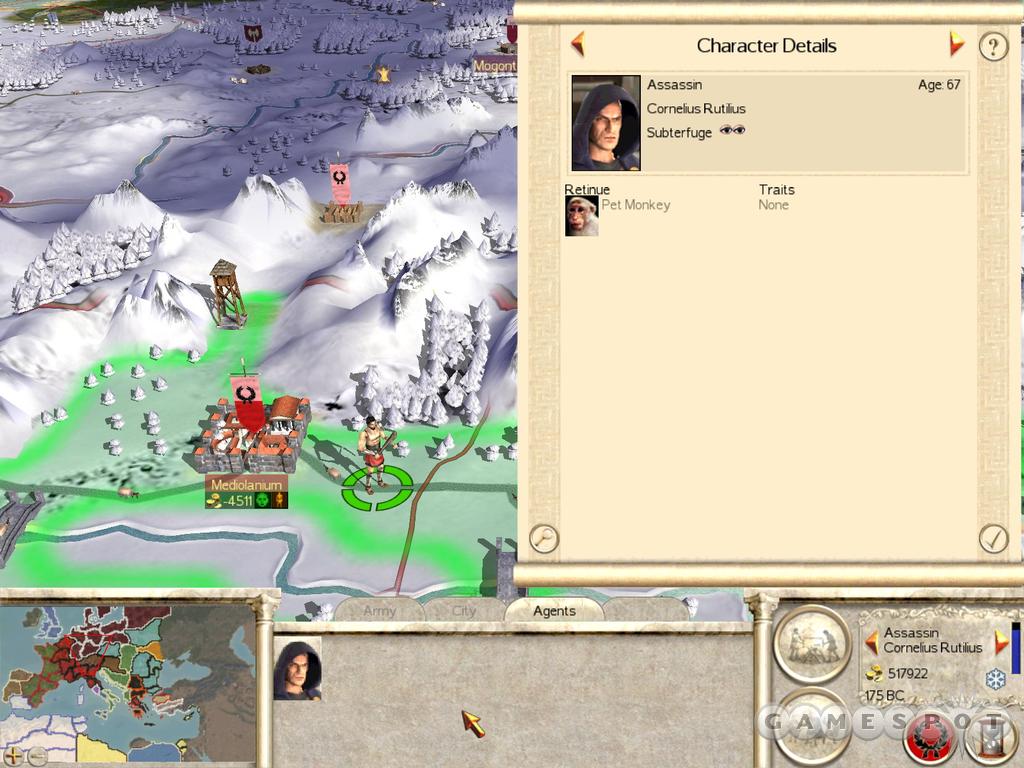Rome: Total War Designer Diary #5
Writer/designer Mike Brunton keeps things relative as he explains all the exciting, new gameplay possibilities you'll have managing your big, unruly Roman family.
In the past, we've covered the huge, epic scale of Rome: Total War, the exciting, upcoming strategy game from Activision and British developer Creative Assembly. In Rome: Total War, you'll command the legions of Rome (and several other factions) on the battlefield in stunning 3D. But between the real-time battles, you'll engage in a deep, sophisticated, turn-based strategy game as you attempt to consolidate your power over the ancient world. And, as it turns out, families will play a large part in this process, because you'll need to maintain and manage a burgeoning clan of distinct personalities to succeed. We'll let Mike Brunton, writer and designer for Creative Assembly, explain.

All in the Family
By Mike BruntonWriter/Designer, Creative Assembly
Outside our "luxury development facility" at Creative Assembly, the sky is a deep blue, the sun is shining, and we're currently basking in positively Mediterranean levels of warmth. (Inside, we're all working like galley slaves, only without a big greasy bloke beating a drum in the corner!)
On a day like this, it's not so hard to see why Romans would want to conquer somewhere at the very edge of the world--somewhere like Britannia. As the Roman ruins that dot the landscape all over this corner of Britain show, they weren't so very different from people today. For example, they liked their home comforts, keeping up with the neighbors, and spectator sports. The mosaic floors of the villa at Bignor are covered in gladiator images, which is not so very different from covering the walls in soccer team posters.
This leads me neatly to the people in Rome: Total War--the generals, governors, diplomats, spies, and assassins--that you'll be ordering about to either aid your noble work of bringing civilization to the world or assist you in nefarious schemes to make you absolute ruler of all you survey. It's all a matter of perspective. These people add "personality" to the gameplay in the shape of their own personalities. Factions themselves already have "personality" and flavor in terms of their technology trees and unit lists. This allows the Romans to play very differently from, say, the barbaric Germans.
Here, though, I'm going to talk about how we've made game pieces into people that, hopefully, you'll find interesting. A general should be an interesting person rather than just a man with a big shiny helmet and a colorful plumage. It's our belief that it's more involving to think that your favorite leader is a "None Shall Pass" expert infantry commander rather than a "General +5," as if he was some kind of disposable magic sword. A man who is an expert infantry commander is worth having in battle, and he's worth keeping around to see what other skills he can gain. As you'll see, the character mechanisms we've developed are a great way of getting all-important flavor and snippets of history into the game!
Now Medieval: Total War did give generals and the royal family mini-personalities, but they were nearly always fairly unpleasant personalities! With Rome: Total War we've fine-tuned the system by: (a) throwing all the old material away and (b) starting again. We've also added new layers to the way characters work with the family tree and retinues.
A Roman Party Posse
Let's start by looking at the family tree. It's a sensible framework for the "royal family" of each faction, and it's something that everyone can understand instantly. At a glance, you can see how many characters you have available to be generals and governors in your burgeoning empire. You can also see how many children are growing up and so forth. We've added in a system for adoption so that you can pep up your family ranks with some new blood. Actually, this is one of the cool bits in the game. Lesser generals in the game are referred to as "captains," and if one of them does really well when commanding an army, you'll be given the option of adopting him. Instant new general! Even better, adoption was a very Roman thing, and this kind of gameplay mechanism immediately makes the game more realistic without frightening everyone away who wants to play a game rather than be "realistic." Cunning? Us? Surely not. 
All of these people can develop traits, quirks, virtues, vices, and whatever else you want to call them depending on their birth and life experiences. Buried in the code for characters is the whole "nature versus nurture" idea for the way characters grow and change over time. Some things can be inherited from Daddy. It's quite possible for the son of a famous general to find that some of Dad's reputation has rubbed off on him. Occasionally, though, there'll be a rebellion against parental values, and the son will turn out to be the opposite of his father--like the son of a vicious drunk man who discovers sobriety and hard work and never looks back, for instance. Some characteristics also run in the family. For example, the Scipii family really did believe that it was favored by the gods, and this is reflected in the game.
During the game, life experiences for characters are used as triggers for their personalities. So the man who survives an assassination attempt could become very security conscious or even paranoid. Similarly, the general who gets into hand-to-hand combat might just develop a taste for violence, while the man left to fester in a distant frontier town is likely to find his own...amusements. Likewise, the general who is beaten by Carthaginians may start to hate them, and so on. There are around 700 virtues and vices that can be dished out to characters depending on what has happened to them, where they are, and who they are. We think you'll find this an interesting part of the game, and we may have snuck in a few funny ones as well! You'll also find that lesser characters, like diplomats, spies, and assassins, also get personality quirks as they carry out your orders. A tyro assassin can find that he has a talent for murder after all, or a diplomat can turn out to be tactless (not so good, that one).
That's only part of what we do to characters, because we've also introduced the idea of retinues into the game. These are the hangers-on, servants, best friends, and lackeys that all "great men" have in abundance. Welcome to the Rome: Total War equivalent of "the posse."
Depending on where they go and what they do, your characters will start gathering a collection of followers to aid them in their day-to-day lives. A Greek turncoat, for example, helps whenever a general is facing a Greek army. A tutor can also be a lifelong friend, adviser, and aide when trying to run a city properly. There are many of these lesser characters to be found--from an architect to a slave trader, a master archer to a priest of Vulcan, an exotic slave (just for show) to a faithful hunting dog--and we've even included one or two "pets." If you find the sheep, well done. But don't you think your family would like to talk to you occasionally? Nearly all of these people will help your character, as well as add color and interest to the game. We've used ancillaries to sneak in some historical characters into Rome: Total War that would otherwise be ignored in strategy games, such as Titus Maccius Plautus. He doesn't sound interesting? Well, he was kind of interesting--and fairly smutty too! He wrote the farces that A Funny Thing Happened on the Way to the Forum is based on. And for your general, he might just write a farce that makes him very, very popular with the Roman mob. Cunning and sneaky realism--with added gameplay--inserted into Rome: Total War once more!
And that, for now, just about wraps up the discussions of Rome: Total War in these developer diaries. If you've been reading, thanks. If you've enjoyed this, tell your friends. If you haven't played Rome: Total War yet, then hopefully you'll soon be treading in Caesar's footsteps. Valete!
Got a news tip or want to contact us directly? Email news@gamespot.com
Join the conversation